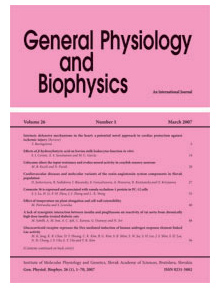Journal info
|
||
Select Journal
Journals
Bratislava Medical Journal Ekologia - Ecology Endocrine Regulations General Physiology and Biophysics 2025 2024 2023 2022 2021 2020 2019 2018 2017 2016 2015 2014 2013 2012 2011 2010 2009 2008 2007 Neoplasma Acta Virologica Studia Psychologica Cardiology Letters Psychológia a patopsych. dieťaťa Kovove Materialy-Metallic Materials Slovenská hudba 2025Webshop Cart
Your Cart is currently empty.
Info: Your browser does not accept cookies. To put products into your cart and purchase them you need to enable cookies.
General Physiology and Biophysics Vol.28, No.3, p.276–282, 2009 |
||
| Title: Temporal analysis of electroretinographic responses in fishes with rod-dominated and mixed rod-cone retina | ||
| Author: Milena Milošević, Željka Višnjić-Jeftić, Ilija Damjanović, Miroslav Nikčević, Pavle Andjus and Zoran Gačić | ||
| Abstract: Photoreceptor content of fish retinas could be accessed by comparative electroretinographic (ERG) studies using flickering light stimuli that could separate rod-mediated vision where critical flicker frequency (CFF, frequency when the eye loses its ability to resolve individual light pulses) is usually less than 15 Hz from cone-mediated vision. Four fish species inhabiting different photic environments (small-spotted dogfish shark – Scyliorhinus canicula, eel – Anguilla anguilla, painted comber – Serranus scriba, Prussian carp – Carassius gibelio) were investigated. Dogfish shark b-wave amplitudes significantly decreased at low frequency of stimulation and CFF was reached at 3.2 Hz. A similar effect on the b-wave amplitude was observed in the eel, but CFF occurred at around 20 Hz. Conversely, b-waves of painted comber and Prussian carp remained unaltered under intermittent low-frequency stimulation, and CFFs were around 25 and 30 Hz, respectively. Additional support in accessing the receptor content of fish retinas was given by the characterization of the OFF-response (d-wave) after light adaptation. Monotonous time course of the b-wave dark adaptation indicated a rod dominated retina of the dogfish shark. Observed results indicate that the dogfish shark possesses preponderantly rod retina, that of the eel is rod-dominated, while Prussian carp and painted comber have cone-rich retinae. |
||
| Keywords: Critical flicker frequency — Dogfish shark — Eel — Painted comber — Prussian carp | ||
| Year: 2009, Volume: 28, Issue: 3 | Page From: 276, Page To: 282 | |
| doi:10.4149/gpb_2009_03_276 |
||
|
|
 download file download file |
|

